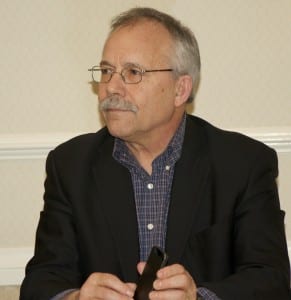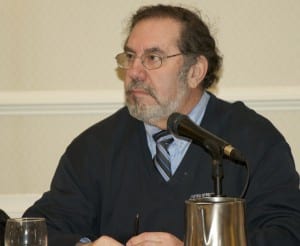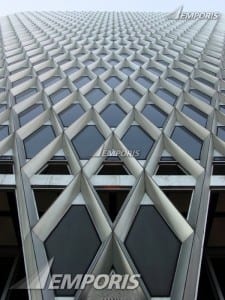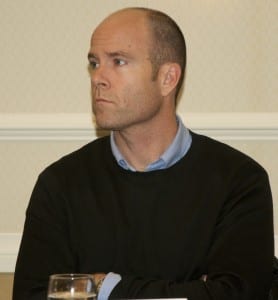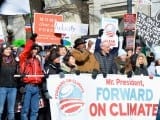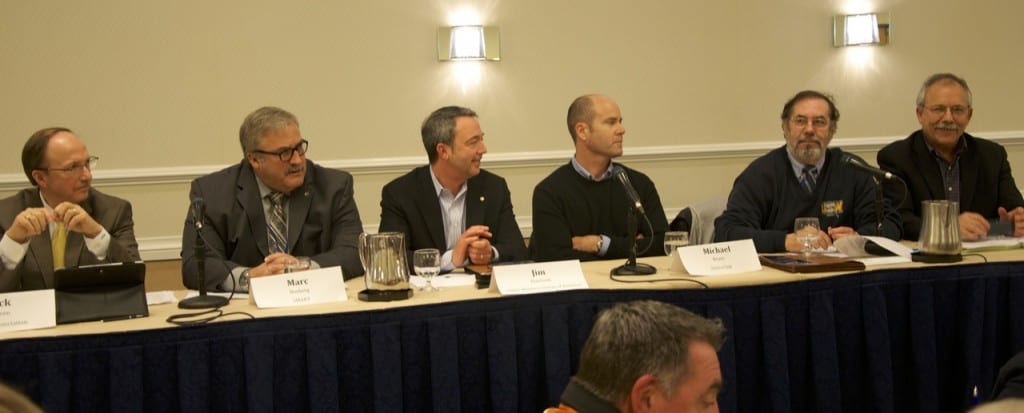
Panelists Rick Terven, Political Director the United Association (UA); Marc Norberg, Assistant to the General President for Sheet Metal Workers Union of America (SMWIA); Jim Harrison a National Representative for the Utility Workers Union of America; Michael Brune, Executive Director of the Sierra Club; Leo Gerard, International President of the United Steelworkers (USW) ; David Foster, Executive Director of the BlueGreen Alliance, created to bring union members and environmentalists together in a powerful political coalition: Glynn Wilson
By Glynn Wilson –
WASHINGTON, D.C. – The opening session of the Good Jobs, Green Jobs Conference for 2014 kicked off Sunday night with a dynamic panel of speakers who are at the forefront of the national discussion about how to address the country’s crumbling infrastructure, while at the same time beginning to deal with the growing problem of climate change due to global warming from the burning of fossil fuels.
All of the speakers were united in the fact that unions and environmentalists are a stronger political force if they work together rather than focusing on the differences between them and allowing themselves to be divided by the “bullshit” on talk radio, Fox News and elsewhere, especially the anti-union and anti-environment propaganda of the Koch Brothers.
Representing a diverse cross section of America who speak for millions of environmentalists, workers who forge American made steel, install heating and ventilation systems, maintain utility systems and the vast network of pipes around the country, the speakers spoke to the fact that tackling climate change is an opportunity, not just an obligation.
Blue Green Alliance Executive Director David Foster led the opening panel and introduced the speakers by setting up this year’s theme, the nation’s infrastructure as the bridge between creating good jobs and addressing climate change.
A lot of the infrastucture around the country was built in the 19th century, he said. “You can’t fix a 21st century environmental problem with a 19th century infrastructure that cased it in the first place.”
“If we went out and repaired them all today we would be creating the 11 million jobs America needs,” Foster said. “And if we went out and fixed it today, we would be pulling the carbon out of the atmosphere that’s causing the wacky weather we live in.”
Foster said Leo Gerard, International President of the United Steelworkers Union, has been a leader in the movement to educate union members, other organizations, politicians and the administration in Washington “that you don’t have to choose between good jobs and a clean environment.”
But Gerard said it’s a “huge challenge,” especially when all news reporters want to focus on are issues where the unions and environmentalists disagree.
He said some in the media should look at the things they agree on, the things they could mobilize for, the amount of carbon they could take out of the air and the millions of jobs that could be created.
“We lose 10 to 15 percent of the energy we put on the grid,” he said. “How stupid is that?
“We have maybe 50 percent of the schools in America that are more than 60 years old,” he said. “That means they are using antiquated heating and cooling systems (and) our kids are not in the best learning environment.”
He said we have something like 86,000 bridges and 4,000 dams that are deficient.
“Instead of fixing the dams, the insurance companies are jacking up flood insurance up to 20 percent. That not only puts our towns in jeopardy by our plants as well,” he said. “So the things we can all agree on, the things all of us in this room should to be fighting for, is to really start a major program of fixing the infrastructure.”
The cost to repair it all, he said, has been estimated at $3.6 trillion.
“You are not going to do that in six weeks or six years,” he said. “But we ought to put a program together to start retrofitting our schools and public buildings, fixing our bridges. And we should all have a fight that it ought to be made in America.”
To put its money where its mouth is, the United Steelworkers Union is spending $6 million to retrofit its own national headquarters building in Pittsburg, Pennsylvania.
“While they’re playing games and trying to find the places that can keep us divided,” he said, the union leaders and environmental leaders he is in contact with through the Blue Green Alliance all agree on 95 percent the issues. And they are in 100 percent agreement on rebuilding the infrastructure in a way that creates green jobs.
“What’s lacking?” he asked. “Political will and mobilization. That’s why we created Blue Green. To stop the bullshit, to be blunt, that you can’t have good jobs and a clean economy. It’s not one or the other. It’s both or neither over time.”
Watch the video…
Michael Brune, executive director of the national Sierra Club, said reporters will always focus on the divisions, but it is the obligation of leaders to talk about the 95 percent of issues on which they agree.
He said there has been a change in the thinking at the Sierra Club over the past couple of years to get away from just opposing everything from coal and fracking for natural gas to nuclear power and instead declare what environmentalists are for.
Instead of just complaining and blaming somebody else for our problems, he said, the Sierra Club is trying to add a third category.
“This could be awesome,” he said. “It’s to look at fighting climate change and protecting the environment not just as an obligation, but as an opportunity. Not as something that we’ve got to do, but as something that we get to do. Because there are millions of jobs in energy efficiency where we save money and produce jobs by making the environment cleaner.”
He cited the need to repair the pipeline infrastructure, water and gas, where carbon emissions are saved along with scarce water resources.
“We save money, put people to work and protect the environment at the same time,” he said. “We want to be 100 percent powered by clean energy. We know it will take a long time to get there. We are 100 percent committed to doing this in a way that is good for workers, communities and workers rights.”
He said the best way to bridge the differences is to be honest about it.
“We have to be bigger in our ambition, bolder in what we are shooting for, and to unite around an aggressive vision for restoring workers rights, for expanding the jobs base in the U.S. and for building an economy that works for everybody.”
Watch the video…
UWUA’s Jim Harrison said in the new industrial revolution underway now, “we don’t have to subscribe to making a trade between jobs that are green jobs, jobs that are supportive of the environment, and good jobs. We shouldn’t be forced into making that trade.”
It’s important for workers, and their allies and the progressive folks to assert their power and to say that.
“If we don’t work together to watch out for each others’ back, then we’ll be forced into the same kinds of things that have happened to workers throughout history. There will be winners and losers and victims.”
One idea is to capitalize the skills of union workers such as electricians, and transition those skills into work to help modernize the grid. There should be a way to finance transitioning workers in communities impacted by changes, as when an old power plant shuts down and the power companies use new technologies such as natural gas.
“Grow economic development (and) opportunities for workers to transition to infrastructure repair,” he said.
Utility workers have been talking about a wire charge on distribution and transmission.
“Stockholders shouldn’t be the ones to make out when plants close,” he suggested. “Workers and communities” should benefit, he said. “That money could be utilized to support workers and their communities to ensure that there is indeed a just transition. That’s a solution that we could really look at.”
Watch the video…
There are pipes in the ground that predate the Eisenhower days, according to Rick Terven from UA. He indicated leveraging public and private investments are the way to go.
“If we don’t do it right and do it safely it doesn’t matter,” he said.
Watch the video…
Sheet metal workers who work on ships, trains and planes are deeply invested in energy management and energy savings, according to SMWIA’s Marc Norberg.
Questions and Answers: Watch the video…


